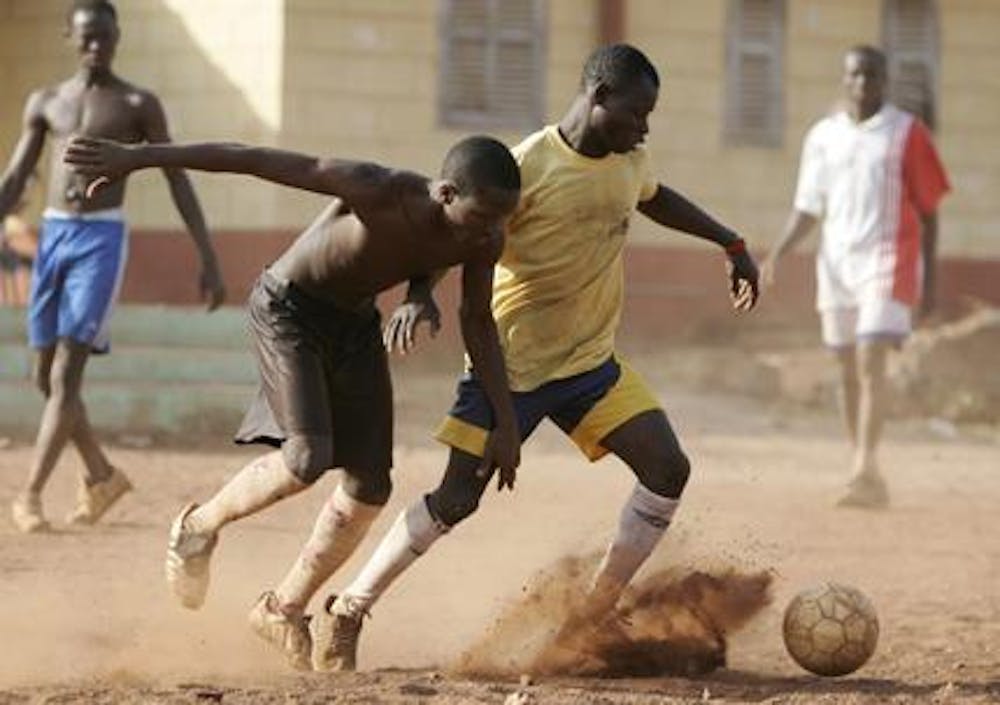THE ASSOCIATED PRESS
DOHA, Qatar - Anthony Bassey Bassey developed his ability to deftly juggle a soccer ball in the rain and the mud of his native Nigeria, dreaming of someday playing for the powerhouse Spanish team Barcelona.
Now the 13-year-old practices in a soaring, air-conditioned domed stadium in this tiny, ultra-rich Persian Gulf nation - thousands of miles from home.
Bassey is one of 23 players who made it to Qatar for the final round of the largest talent search in soccer history, a screening of 400,000 boys his age across seven African countries.
The tryouts were held by the Aspire sports academy, which is funded by Qatar's government. In the coming days, the school plans to announce the names of a handful of the players who will receive full scholarships to study and train at the campus in Doha.
The Nigerian teenager looked around in awe at the gleaming stadium.
"Aspire is the best academy that has the best facilities that I have seen in my life," Bassey said. "I came here to have more experience about football, to become a professional and to have my bright future."
The contest has catapulted Qatar to the front in the race for one of Africa's most precious resources - its skilled young soccer players. But like China's quest for African oil and minerals, the push by Aspire has sparked controversy.
The school acknowledges it targeted younger players because the older ones already have been scooped up by agents.
Josep Colomer, a Spaniard who heads Aspire's initiative, said it chose Africa because places like South America have already been thoroughly mined for players.
"I realized that Africa is full of talent, but nobody is taking care of them at the early age of 12 or 13," he said.
Many see a golden opportunity for poor, talented African youths.
"They're doing African football a big favor. … They (Qataris) have a lot of money, and this is better than just putting up new stadiums," said former World Soccer magazine editor Keir Radnedge.
Added sports economist Andrew Zimbalist of Smith College in Massachusetts: "They're endowing them with skills; they're giving them market exposure they might not otherwise get. … I don't see how that's exploitative."
Others worry that Qatar's real aim is to enrich its own national teams down the road - something it has tried before. There also are fears the program may not have enough social safety nets in place for those young athletes who don't make the final cut.
"This might be a good idea for the very small number of kids involved, though few of them are actually likely to make it as professional players," said John Williams, director for the Centre for the Sociology of Sport at the University of Leicester. But he asks: "What happens to those who fail? … Educational and other support backup is crucial here."
Either way, Qatar's massive recruitment of young Africans, backed by the country's oil and gas riches, is certain to raise concerns, not just across a Mideast increasingly wild about sports, but in the rest of the soccer world.
"What I would say to the people in Qatar who are thinking of doing this is, 'Be careful, you are dealing with children,'" said Tunisia soccer coach Roger Lemerre, who led France to the European Championship in 2000 and was coaching this week in the African Cup of Nations.
Aspire held 25,000 soccer matches at almost 600 fields in Cameroon, Ghana, Kenya, Morocco, Nigeria, Senegal and South Africa from May through November 2007, distributing 35,000 soccer balls and more than 15,000 jerseys. Among those who tried out was a boy who had 26 siblings and another who came in the only shoes he owned - a pair of dress shoes, cracked and full of holes.
It chose three players from each country and three goalkeepers, and flew them to Qatar for a month of tryouts. One was Bassey, a midfielder from southern Nigeria who impressed scouts with his juggling even before the tryouts began. Out of the 24 players chosen, 23 remain after one was sent home for medical reasons, school officials said without providing details.
Aspire, which will offer its scholarship winners a high school education alongside sports training, does not appear to break any rules of soccer's governing body, FIFA, which prohibits professional clubs from moving players under 18 across borders.
Ivan Gazidis, deputy commissioner of Major League Soccer in the United States, said the FIFA rules have "reduced some of the more extreme circumstances of child exploitation."
While not directly affiliated with a professional soccer club, Aspire officials say they will own the players' rights, acting as their agents when they begin playing professionally.
Aspire is one of many soccer academies that FIFA has little ability to govern, although it has in general expressed strong concerns about the increasing movement of young Africans from their home countries.
FIFA refused to comment directly on Aspire "without having the complete official information on its activities."
European and Latin American professional clubs and academies have long recruited the young, mostly locally, but also in Africa and elsewhere.
At IMG Academies in Bradenton, students in the soccer program may enter at age 10. The school has students from overseas but does not recruit like Aspire, it said. And unlike Aspire, it allows its young players to sign with whichever agent they want if they go professional.
A bigger issue is naturalization: FIFA has strongly criticized aggressive naturalization of players with few links to their new countries and tightened its rules after denying Qatar's attempt to grant three Brazilian players citizenship to help it qualify for the 2006 World Cup.
Aspire officials deny naturalization is their goal, saying they hope the Africans' intense drive instead will motivate Qatari players, whose work ethic, they say, has been dulled by a lifetime of affluence.
But Aspire does not rule out naturalization, either.
"When making agreements, we are not requiring them to play for Qatar. We leave it up to them," said Aspire's German sports director, Andreas Bleicher. "A player might be here for five years, and if he wants to play for Qatar, we would not say it is impossible."
In addition to the three Brazilians, Qatar gave passports and Arabic names to eight Bulgarians shortly before the 1999 world weightlifting championships in exchange for an undisclosed sum of money. One of them, Saelem Nayef Badr, won two gold medals at that event. Kenyan runner Stephen Cherono also later changed his name to Saif Saaeed Shaheen and set a world record in the steeplechase in 2004.
Radnedge said he would expect many of the African players to become naturalized Qatari citizens.
"If they're there for … years and find a much better lifestyle there, your natural inclination would be to embrace it," he said.
Most of FIFA's concerns focus on outright trafficking - the practice of local agents, often unscrupulous or with few credentials, cutting deals with young players or their families, and then marketing them to professional clubs.
Some believe FIFA should be even more aggressive.
Jean-Claude Mbvoumin, head of Culture Foot Solidaire, a charity set up to help African teenage players trafficked to Europe, asked FIFA last year to stop Aspire's talent search because he believed it violated the spirit of the international rules on moving athletes under 18.
Aspire defends its program, saying it is providing opportunity to the players.
"Some of these children came from the poorest areas and had nothing," Bleicher said. "They didn't have shoes, they didn't have a ball, so they used what they had to play: a Coke bottle or a ball made out of socks. Their only dream is to become a professional football player and leave the poverty of the area."
It adds that it works closely with parents, consulting with them before moving the children abroad. The academy has not said if the players' families will move with them to Qatar - something sociologist Williams calls key to their protection - or how it will help those who fail.
It also points to support it has received from African soccer federations and from figures such as Pele, widely considered the world's greatest player.
Aspire said it is considering opening an academy in Africa someday, a possible response to activists' criticism.
It is not clear how much Aspire spent on its recruitment drive, but the government budgeted $2 billion to build its Sports City, which includes Aspire and its facilities, among them the largest multipurpose indoor sports dome ever built.
There's a stadium that can seat 15,000 people, and 10 individual arenas. Facilities include a running track, swimming pool, gymnastics arena, squash courts and a full-sized indoor soccer field, all housed within a climate-controlled environment to counter the soaring heat in the Gulf region.
Midfielder Bernard Appiah of Ghana marveled at the lush grass on the soccer field.
"Normally, we just play in the sand sometimes, but we don't have this kind of grass, only like sand," he said.
Asked if it was difficult to leave Ghana for Qatar, Appiah replied, "It is not easy, but by the grace of God, everything is good."
Colomer said he came up with the idea of an African talent search while working as youth director at Barcelona, one of Spain's top clubs. But he held off pursuing it until he came to Qatar in 2005, because he thought the idea would be criticized.
"If it is a club, everyone will say the club is stealing players," said Colomer, who brought Argentine teenage star Lionel Messi to Barcelona. "But if it is an academy, people will say the school is giving the kids an opportunity."
All that leaves many feeling conflicted.
Karim Haggui, a 24-year-old Tunisian who plays for Bayer Leverkusen in Germany but competed this month in the African Cup in Ghana, said he sees the Qatari academy as both an opportunity and possible exploitation.
"There are a lot of youngsters - a lot of talent - who are here and who finish their careers in Africa without anyone ever seeing them," Haggui said. But if Africans end up playing for another country's national team, he added, "it becomes commerce."
Associated Press Sports Writers Jerome Pugmire in Tamale, Ghana, and Chris Lehourites in London, and Lily Hindy in New York contributed to this report.






